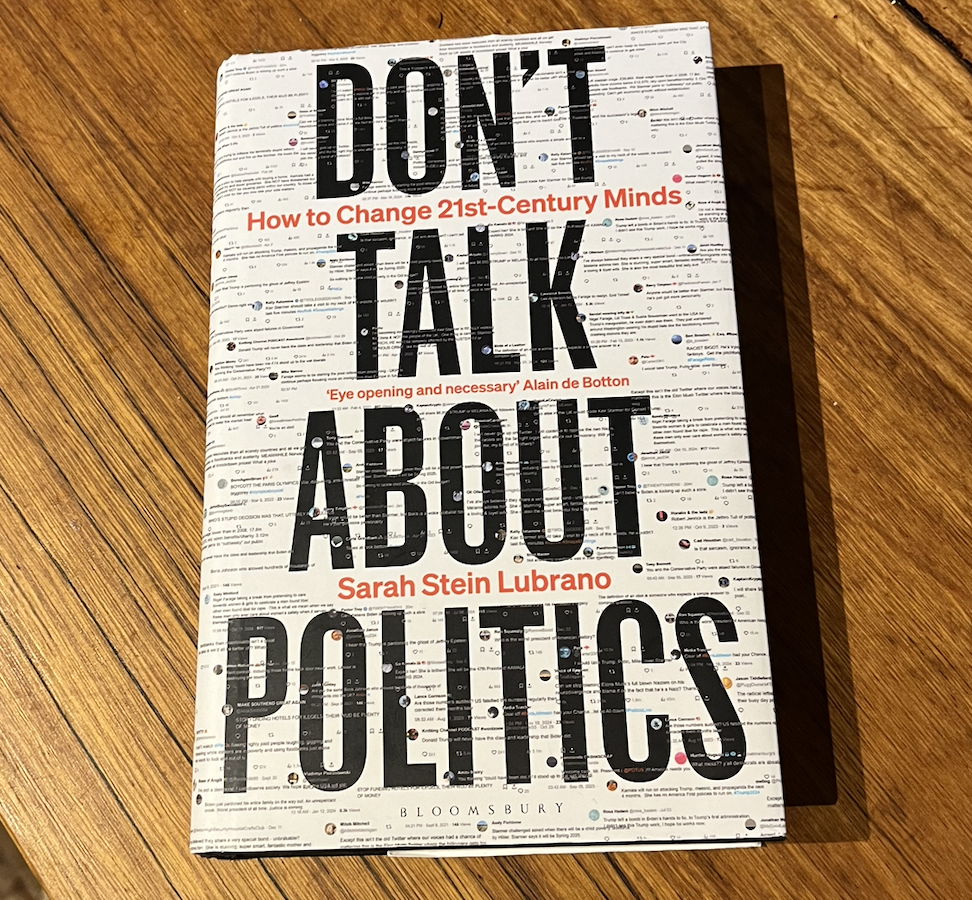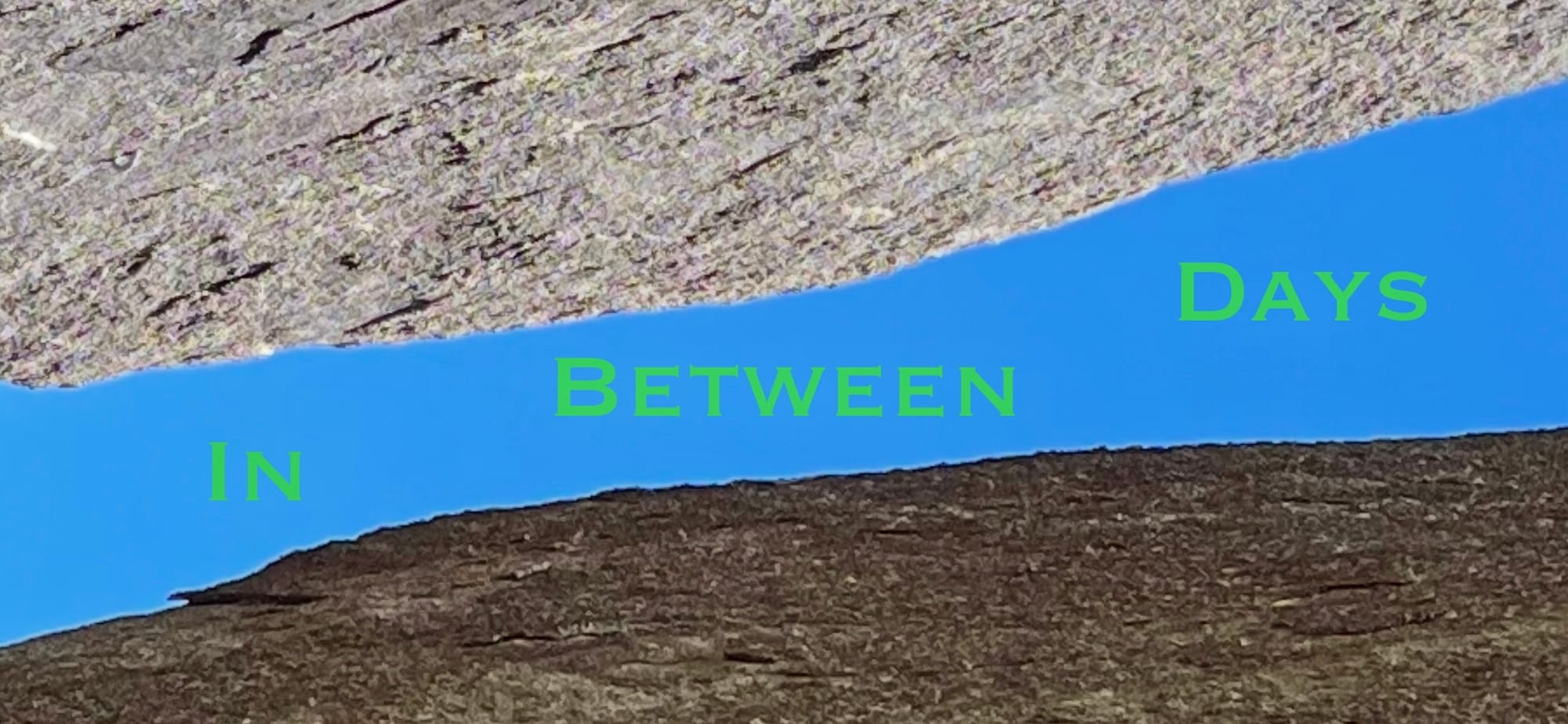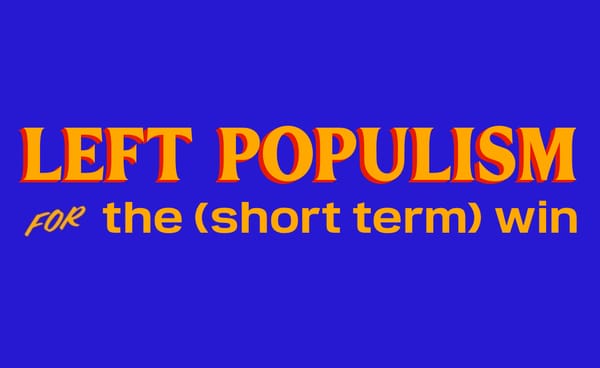The Hitchhiker's Guide to Political Psychology?

"The point, in short, is that we need to talk less about politics (in the sense of arguing with people) and instead build a world where those people are likely to encounter more and thus change their minds. This kind of work of organising and building social networks and changing the world is in many ways more a form of reasoning than anything that just happens with words."
Sarah Stein Lubrano, Don't Talk About Politics, Bloomsbury 2025, p164-5
It doesn't quite say "DON'T PANIC" on the cover in big friendly letters, but I think it helped me know where my towel is...
You know when you've been grappling with difficult and troubling thoughts and you read something that helps click them into shape in your mind?
Sarah Stein Lubrano's book, Don't Talk About Politics, arrived just at the right time for me. Actually, frustratingly, it was only released in Australia a couple of months after I heard her excellent interview on Rachel Donald's Planet Critical podcast, so I had to wait! And, while I'm very glad it's here, I do wish (as we'll come to later) that it had had a couple more months in the editing process. But, truly, it is excellent, and important for this political moment.
Here's why.
One of the biggest shake-ups to my sense of understanding of politics and change-making has been the slow realisation, through personal campaigning experience over recent years, that talking to people about political ideas doesn't change their mind anymore. Maybe it never really did. But it certainly does so less than ever now.
This has come as a bit of a shock.
I'm a leftie Jewish intellectual. We talk. We debate. We discuss ideas. It's what we do.
My mother is a linguist. Language is what we use. No - much more than that. Language is what we are. Using language to discuss ideas is core to my idea of who I am, and my idea of who humans are.
I've spent most of my adult life working in political communications in some form or another: campaign comms for Greenpeace; political comms for the Greens; comms training for campaigners and politicians; carefully crafted writing (op eds and media releases, social media posts and flyers and a whole book); thousands upon thousands of conversations at people's doors and at stalls and on polling booths.
It became ever clearer to me, over time, that the relationality of those conversations, the connection we were forging, was more powerful than the ideas we discussed. But I still had faith that the ideas were key - the connection was the bridge to the discourse.
The last couple of elections, it basically stopped working. The connections were harder to spark in the first place. And the ideas didn't budge.
Some of this has been discussed in terms of misinformation and disinformation, the "polarisation of politics", the failure of the media and the rise of social media. And all that is true and relevant. But there's something deeper going on.
Things came crashing in for me after the October 7 attack, when I tried desperately to have conversations with people across difference. Both among dear Jewish friends and close friends on the left, I found we were inhabiting different planes of reality. There was truly no space for conversation. Discourse was dead.
Then, a second crash with Trump's reelection a year later.
You might have already heard me talking about a great video I saw of a MAGA guy being interviewed outside a Trump rally, waxing lyrical about how his friends work in what is obviously, from his description, a workers' coop. He'd punch your lights out if you called him a socialist, but he loved the idea of collective ownership and management in practice. And I've spoken about the phenomenon of people voting for abortion rights and for Trump, voting for increased minimum wage and voting for Trump.
Why are we talking about shit in the same old way? Politics-as-usual is so over.
That day, almost exactly a year ago, I posted to Bluesky:
Relatedly, my new mottos is Fuck campaigning This old model of going and talking at people, trying to convince them of our position? This old model of building power and then abdicating it by asking “decision-makers” to act? Fuck that. It’s over Mutual aid and community-building are the future
— Tim Hollo (@timhollo.bsky.social) 13 November 2024 at 13:28
Sarah Stein Lubrano is a leftie Jewish intellectual like me. She's apparently been grappling with similar challenges to her structures of thinking, and examined them through a rather prestigious doctorate from Oxford, studying the "intersection of cognitive dissonance theory and critical theory."
There's a powerful observation early in the book (p17) where Stein Lubrano reflects on growing up in Washington DC, hearing ads on the radio for defence contractors selling insanely expensive military equipment that only government could buy. So why are they advertising on radio? It's a highly relevant question for those of us living in, or flying in and out of, Canberra, where the airport is plastered with advertising for military equipment. Stein Lubrano explains that these ads aren't simply targeting politicians and public servants who are making purchasing decisions, which is the usual pat explanation. They are about:
"making it seem as though the main political question at stake is not whether we should buy assault helicopters at all but rather whether we should buy them from Raytheon or Lockheed Martin.
They are about the manipulation of public discourse through (and towards) brute, coercive and material power. In the same vein as Musk's purchase of Xitter (an example she discusses at length), they are about shaping the norms of public discourse, controlling democratic infrastructure, limiting what is possible, curtailing our imagination of the way things are and might be.
It's not what is being said. It's not even how it's being said - the words and framing. It's the meaning embedded in the fact that it is being said.
Stein Lubrano effectively dismantles the mythology of the marketplace of ideas - that we select the best ideas from those presented; that these ideas compete on some level playing field. I don't think most of us genuinely believe that anymore, but, if we critique it, we do so in terms of the uses and abuses of power to unbalance the playing field, not its underlying reality. We continue to behave as though we believe in it, since it is embedded in the individualistic liberal idea of politics and discourse that we continue to engage in. Why? Because it's there in front of us.
This is explained through one of the central concepts of the book: affordances. Defined here as "the action-possibilities that a particular tool or technology permits or suggests; ... what a given situation or technology 'affords' their user" (p88), affordances are core to cognition in general, and political cognition very specifically.
It turns out that there is evidence that our beliefs about what is right are limited by our beliefs about what is possible. And they shift when what is possible shifts! People who oppose plastic bag bans before they're introduced often support them once they happen, and genuinely forget they ever opposed them. Our opinions are shaped by what we believe is open to us.
Or, as countless people have said to me in recent election campaigns, "I mean, sure, that policy sounds great in principle, but I don't believe it'll happen, so I wouldn't vote for it..."
One of the affordances of politics today is liberal public discourse. We use it because it's there, and therefore we believe in it. But it doesn't work.
A central reason why it doesn't work is explained through the other core psychological concept in the book: cognitive dissonance, defined as the "discomfort that emergences when our actions contradict our beliefs" (p23).
While we're very good at subconscious, post facto rationalisation, our "reasoning" about political ideas is rarely rational. Through confirmation bias, we select ideas that match our behaviour and social identity. Through reactance, we push back against perceived threats to our free choice. And we find paths that are about reducing our discomfort, but feel rational.
Stein Lubrano says that what surprised her about her studies of congitive dissonance in political thinking is how ubiquitous it is. It's always there, quietly shaping our opinions and choices and behaviour.
Because our beliefs, identity and sense of agency are all so intertwined, now perhaps more than ever, and because our world is more complex than ever, and we're kept busier than ever, our capacity to grapple with this discomfort is reduced, and cognitive dissonance becomes ever more relevant.
"To insist on discourse as a framework for politics is a symptom of our frustration with how irrational the world is. It is a plea for the world to be intelligible. Who can blame so many of us for wanting that? If only it worked." (p232)
And yes, it is getting worse.
To me, one of the most fascinating sections of the book is the exploration of the idea of social atrophy (she explains it in detail here). Different from simple loneliness or alienation, social atrophy is "the weakening, through disuse, of the neural networks that help us navigate the social world." This has now been shown to lead to loss of cognitive function and reduction in our capacity for "emotional regulation, reasoning and memory." (p180) There's a devastating negative feedback that sees us, driven apart by capitalism and urban design, Netflix and Covid, actually getting worse at spending time together, wanting it less, and losing the actual brain power to do it.
Which brings us back to affordances.
Social infrastructures and public infrastructures, economic material circumstances and ecological material circumstances - all enable or obstruct certain behaviours and interactions and therefore influence our ideas and politics. When our capacity to do things with each - to share and care, to create and discuss, to simply be together while doing things and thereby cultivate community and connection - is captured, enclosed for profit, or designed away, we lose the neural networks that underpin our capacity to live a collective social life, and to do democracy in any genuine way.
Ouch.
But also, oh... Because, thanks to our lovely plastic brains, we can bring these neural networks back, with a little practice.
And that's where the latter part of the book takes us:
"If you want to change people's minds you must change their lives." (p105)
"[I]deas often have to be lived to be understood" (p34) - and lived together with others in ways that grapple with discomfort, try on new identities, open ourselves to new possibilities through agency. This is something I was finding my way to, through theory and practice, in articulating my concept of living democracy as a living practice that we need to live into being together.
"Effective organizing involves providing experiences and actions for people and then giving them space and tools to make sense of what they are doing" (p86) and "people are most likely to engage with new ideas if they are regularly given new, relatively approachable options for how to live these ideas in their lives." (p162)
This leads Stein Lubrano (who, to be clear, does not shy away from conflict) to an important point that, despite activist rhetoric, politics doesn't rely entirely on points of conflict to radicalise people and get them involved. Where forcing conflict demands that we pick a side, generally backing us further away from each other into "wildly unhelpful false binaries" (p59) (relevantly, I saw someone on social media today describing Zohran Mamdani as a liberal Zionist... WTF?), if we put effort into building connections through mutual aid, supporting each other with basic needs, we can truly shift people's opinions and ideas!
In a very Arendtian turn, Stein Lubrano observes that "thinking through ideas is something that we do by acting in the world, often by collaborating, rather than competing, with others, and while necessarily relying on each other." (p68)
On which note, my only quibble with the analysis is that it needs more Arendt ;-)
Actually I do have a more serious quibble. And that's that the book is quite badly edited. There are several major printing errors - not just typos, but whole passages printed twice, I noticed. I would have expected more from a highly reputable publisher like Bloomsbury.
Perhaps more importantly, though, I found the book structurally slightly confusing (maybe reflected in this overly long review?). It's never easy - as I know full well - working out how to piece together the flow of an argument across the scale of a book. But, having completely reorganised my own book in third draft based on difficult-to-hear but excellent feedback, I felt strongly that this could have done with one more solid redraft. Though the ideas are brilliant and well expressed, the book - as a book - felt not quite ready.
The ideas? The flow of an argument? I'm really saying that in critiquing a book that critiques argument? But yes, that's my final observation: there is a challenging contradiction inherent in writing and reading a book talking about politics telling us not to talk about politics. It's not just a funny haha. It raises crucial questions.
The thing is, as I said at the start, I was ready and open to the message. I was already feeling this in my bones, and seeing it in my experiences. There's clearly some confirmation bias in my easy acceptance of what it's arguing.
But what about others?
What do we do about the way the affordances of politics and campaigning push us towards discourse, demand that we talk about politics, make us feel like we have agency, like we're doing something, when we debate people? How do we address the structural affordances that make us believe that top-down power is the only power, or at least that scale and urgency require us to use it, and that push us away from the idea that local community-building and simply bringing people together might effect real, transformative change? What are we to do about the affordances of the philanthropic industrial complex, of NGO culture, of electoral politics?
There is some serious cognitive dissonance facing us if we seek to bring these ideas into our movements for change.
Maybe it's a return to the old onion skin of campaigning - starting with people who are ready. All those who reached out to me when I wrote "fuck campaigning" the day Trump was re-elected. The people who got in touch after my Serious Danger interview, when I said, "with electoralism, even when we win, we haven't won". You people signed up to my blogletter.
Stein Lubrano encapsulates this task beautifully as "becoming stewards of one another's transformation through action." (p106) Together, we can live into being new social and democratic infrastructure, form new neural networks as we create social networks, and shift opinions by leading with collective action.
"We need to stop thinking that talking about politics is the same thing as truly engaging in it, because all the evidence suggests that simply presenting one another with ideas changes very little. Instead, doing politics means taking new actions and building relationships..." (p40)
Don't forget your towel, hoopy froods.
And a final lovely note from Sarah Stein Lubrano for the intellectual types, like me and like her, who don't want to let go:
"We can still love ideas. We just need to love them by living them in the world. Anything less than that is ineffective." (p232)





